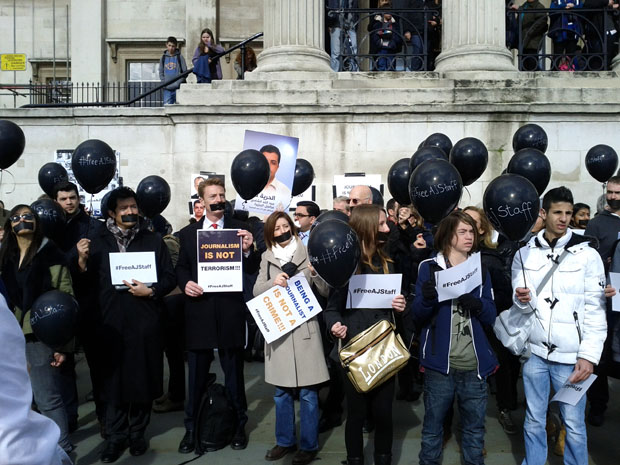Online freedom of speech under threat, Index tells Al Jazeera
On the eve of World Press Freedom Day, Index on Censorship’s Melody Patry speaks to Al Jazeera about the threats to freedom of expression online.
On the eve of World Press Freedom Day, Index on Censorship’s Melody Patry speaks to Al Jazeera about the threats to freedom of expression online.

A London protest calling for the release of jailed Al Jazeera journalists in Egypt (Image: Index on Censorship)
Press freedom is at a decade low. Considering just a handful of the events of the past year — from Russian crackdowns on independent media and imprisoned journalists in Egypt, to press in Ukraine being attacked with impunity and government reactions to reporting on mass surveillance in the UK — it is not surprising that Freedom House have come to this conclusion in the latest edition of their annual press freedom report. This serves as a stark reminder that press freedom is a right we need to work continuously and tirelessly to promote, uphold and protect — both to ensure the safety of journalists and to safeguard our collective right to information and ability to hold those in power to account. On the eve of World Press Freedom day, we look back at some of the threats faced by the world’s press in the last 12 months.
National security has been used as an excuse to crack down on the press this year. “Freedom of information is too often sacrificed to an overly broad and abusive interpretation of national security needs, marking a disturbing retreat from democratic practices,” say Reporters Without Borders (RSF) in their recently released 2014 Press Freedom Index.
Journalists have faced terrorism and national security-related accusations in places known for their somewhat chequered relationship with press freedom, including Ethiopia and Egypt. However, the US and the UK, which have long prided themselves on respecting and protecting civil liberties, have also come under criticism for using such tactics — especially in connection to the ongoing revelations of government-sponsored mass surveillance.
American authorities have gone after former NSA contractor and whistleblower Edward Snowden, tapped the phones of Associated Press staff, and demanded that journalists, like James Risen, reveal their sources. British authorities, meanwhile, detained David Miranda under the country’s Terrorism Act. Miranda is the partner of Glenn Greenwald, the journalist who broke the mass surveillance story. Authorities also raided the offices of the Guardian — a paper heavily involved in reporting in the Snowden leaks.
The Al Jazeera journalists detained in Egypt on terrorism-related charges was one of the biggest stories on attacks on press freedom this year. However, Mohamed Fahmy, Baher Mohamed, Peter Greste and their colleagues are far from the only journalists who will spend World Press Freedom Day behind bars. The latest prison census from the Committee to Protect Journalists (CPJ) put the number of journalists in jail for doing their job at 211 — their second highest figure on record.
In Bahrain, award-winning photographer Ahmed Humaidan was sentenced in March to ten years in prison. In Uzebekistan, Muhammad Bekjanov, editor of opposition paper Erk, is serving a 19-year sentence — which was increased from 15 in 2012, just as he was due to be released. In Turkey, after waiting seven years, Fusün Erdoğan, former general manager of radio station Özgür Radyo, was last November sentenced to life in jail. Just last Friday, Ethiopian authorities arrested prominent political journalist Tesfalem Waldyes and six bloggers and activists.
As more journalism is being conducted online, blogs, social and other new media are increasingly being targeted in the suppression of press freedom. Almost half of the world’s jailed journalists work for online outlets, according to the CPJ. China — with its massive censorship apparatus — has continued censoring microblogging site Sina Weibo, while also turning its attention to relative newcomer WeChat. In March, it closed down several popular accounts, including that of investigative journalist Luo Changping.
Meanwhile, Turkish Prime Minister Recep Tayyip Erdoğan has publicly all but declared war on social media, at one point calling it the “worst menace to society”. Twitter played a big role in last summer’s Gezi Park protests, used by journalists and other protesters alike. Only days ago, Turkish journalist Önder Aytaç was jailed, essentially, because of the letter “k” in a Tweet.
Meanwhile Russia has seen a big crackdown on online news outlets, while legislation recently passed in the Duma is targeting blogs and social media.
Only one in seven people in the world live in countries with free press. In many parts of the world, mainstream media is either under tight control by the government itself or headed up media moguls with links to those in power, with dissenting voices within news organisation often being pushed out. Brazil, for instance, has been labelled “the country of 30 Berlusconis” because regional media is “weakened by their subordination to the centres of power in the country’s individual states”. At the start of the year, RIA Novosti — known for on occasion challenging Russian authorities — was liquidated and replaced by the more Kremlin-friendly Rossiya Segodnya (Russia Today), while in Montenegro, has seen efforts by the government to cut funding to critical media. This is not even mentioning countries like North Korea and Uzbekistan, languishing near the bottom of press freedom ratings, where independent journalism is all but non-existent.
A staggering fact about the attacks on journalists around the world, is how many happen with impunity. Since 1992, 600 journalists have been killed. Most of the perpetrators of those crimes have not been brought to justice. Attacks can be orchestrated by authorities or by non-state actors, but the lack of adequate responses by those in power “fuels the cycle of violence against news providers,” says RSF. In Mexico, a country notorious for violence against the press, three journalists were murdered in 2013. By last October, the state public prosecutor’s office had yet to announce any progress in the cases of Daniel Martínez Bazaldúa, Mario Ricardo Chávez Jorge and Alberto López Bello, or disclose whether they are linked to their work. Pakistan is also an increasingly dangerous place to work as a journalist. Twenty seven of the 28 journalists killed in the past 11 years in connection with their work have been killed with impunity. Syria, with its ongoing, devastating war, is the deadliest place in the world to be a journalist, while some of the attacks on press during the conflict in Ukraine, have also taken place without perpetrators being held accountable. That attacks in the country appear to be accelerating, CPJ say is “a direct result of the impunity with which previous attacks have taken place”.
This article was published on May 2, 2014 at indexoncensorship.org

Chinese fans of American TV have been dealt a serious blow after some of their favorite shows were removed from the country’s main video streaming websites. On Saturday, The Big Bang Theory, The Good Wife, NCIS and The Practice all disappeared from the sites of Sohu TV, iQiyi and Youku. Immediately after, fans took to online forums to voice their disapproval. Netizens lashed out at the government, referring to China as “West North Korea,” a phrase that was quickly blocked from online searches.
No one knows exactly why the government has ordered the shows offline. Others, such as House of Cards and Breaking Bad, both of which have gained huge followings in China and present darker material, remain unscathed. Speculating in the state-controlled newspaper Global Times, leading film critic Tan Fei argued that “the machetes the monitoring departments waved to the U.S. dramas are not only aimed at protecting teenagers’ physical and mental health but, on a deeper level, are aimed at protecting our weak domestic film industry.”
Of Fei’s last point, it’s worth noting that until recently, the main video providers have been free to broadcast shows without the hurdle of obtaining official approval. China’s TV stations, by contrast, are heavily restricted when it comes to content. Poorly acted soap operas and over-the-top dramas about corrupt emperors and the Sino-Japanese War are the mainstay of these channels. As a result, viewers have fled to the more free and entertaining realms of online TV.
In order to lure people back, state-owned television channels have started to broadcast some of the same shows as Chinese streaming platforms, albeit censored versions. China’s national TV broadcaster CCTV will soon air The Big Bang Theory and has recently introduced a dubbed version of Game of Thrones to its paid channel.
Li Bingwen, who has worked for Chinese state media and is now at a western publication, watches a range of popular US shows, including the ones that have been removed. For Li, who tells Index that Chinese TV shows make him “doze off”, the latest government move is “cynical.”
“Forcing video web sites like Youku.com to remove The Big Bang Theory from their play lists is the most cynical act by Chinese censors ever. Banning speech for ideological reasons is evil but understandable. Taking a show off the site of a private company just so a state-owned broadcaster can air it is the new height of hypocrisy.”
Commerce doesn’t explain the move entirely though. The development comes as the government is tightening control of all areas online, particular the areas that attract the most attention, which these shows do.
“There’s been a tendency for the government to treat different forms of communication differently when it comes to censorship, being most restrictive about the media that reach the broadest spectrum of people,” explained Jeffrey Wasserstrom, a prominent academic and author of China in the 21st Century: What Everyone Needs To Know.
“The internet was seen for a time as having less broad a reach than film and television, so you were given more latitude for what you said online as opposed to in a television show. Now, of course, streaming content and growing numbers of people who go online regularly blurs that distinction,” he added.
While people of all ages within China watch these shows, it is the youth who tune in the most, and are therefore the most affected. On top of making up the biggest proportion of online users, the under-30 demographic are particularly drawn to the themes of the shows, and disillusioned by those themes presented on Chinese TV. For example, the story of science geeks trying to find their way in the world post graduation, as is illustrated in The Big Bang Theory, resonates with millions of young Chinese. With the job market in China becoming fiercely competitive and living costs soaring across major cities, graduates are now finding their dreams scuppered, much like the characters of this show.
Today’s Chinese youth also see US and UK shows as windows to foreign cultures, and more importantly, as exercises in English. For many of these people then, who might be politically apathetic, or at least profess to be so, the recent attack will be a first direct taste of censorship.
“Moves like this, which limit access to works of western popular culture, are particularly significant for Chinese youth,” Wasserstrom said.
“When people in China go online, as when people in other places do this, they often do so in search not of news but of entertainment and other kinds of non-political things, such as information about restaurants. Being suddenly unable to access a favorite television show is both annoying and a reminder of the prevalence of the government’s ability to exert control over many different aspects of life, when it wants to.”
The battle is not over yet. In the wake of the ban, people have started exploring alternative methods to access the shows. Committed viewers like Li can still gain access to the programmes. Li is boycotting CCTV and says he will explore unsanctioned methods to access the shows.
“If you are really serious, you can find them, maybe on someone’s virtual hard drive that they make accessible to everyone. A friend for example goes to a place to download tons of shows shortly after they air in the US. He is very discreet about that place and he is helping me now.”
Less tech savvy fans will have to await the airing of The Big Bang Theory on Chinese TV and hope it’s not too sanitised. Wang Meimei, another fervent Big Bang fan who Index spoke to, says she’s not holding her breath. She’ll tune in anyway.
“I want to see how much they will ruin a good drama,” explains the 26-year-old curtly.
This article was published on May 2, 2014 at indexoncensorship.org

Striker Diego Costa during the first leg of Atlético Madrid’s Champions League semi-final against Chelsea (Image: Gonzalez Fuentes Oscar/Demotix)
Atlético Madrid are the toast of world football fans at the moment. They’re having possibly their greatest season ever, qualifying for the Champions’ League Final and looking set to break the Barcelona/Real Madrid duopoly over Spain’s La Liga.
Sports fans love nothing more than an underdog story, and the Atlético one feels just right. Always the less glamorous team in the Spanish capital, they’re finally having their time in the sun. Only a complete killjoy would rain on the parade of super striker Diego Costa and his team mates.
So here I go.
Atlético’s shirts bear the advertising slogan “Azerbaijan: Land of Fire”. They are sponsored by the government of Ilham Aliyev, a man who combines the callousness of the classic dictator with the appearance and language of an aspiring sales executive who’s read one too many management manuals. His Twitter page bears the fascinatingly banal phrase: “We turn initiatives into reality.” I have absolutely no idea what that means (suggestions in the comments, please). Whatever it does mean, he’s clearly quite pleased with it, as it pops up regularly on his website.
The deal (sorry, “strategic agreement”) with Atlético came about in December 2012, and was renewed in March 2014.
The explanatory blurb on the Atlético website is packed with more nonsense of the “initiatives into reality” variety.
Atlético is not a football club, it is a “sports entity”.
“The link between Azerbaijan and Atlético Madrid,” we are told, “is much more than a traditional commercial sponsorship associated with a shirt sponsorship, because it has atremendous value, as the tool to achieve important goals, through actions of a different nature, sports, commercial, communication, marketing and corporate social responsibility for the benefit of all parties.”
This is almost poetic in its nonsense; in fact the “actions of a different nature, sports, commercial, communication, marketing and corporate social responsibility for the benefit of all parties” brings to mind no less literary masterpiece than Lucky’s monologue in Samuel Beckett’s Waiting for Godot: “…the practice of sports such as tennis football running cycling swimming flying floating riding gliding conating camogie skating tennis of all kinds…”
All this would merely be amusing if Aliyev was, say, head of a fleet car dealership in Runcorn. Unfortunately, he’s not. He’s the autocratic head of a regime bloated on oil and gas revenue that is engaged in an enormous whitewashing exercise composed of equal parts propaganda and censorship.
The propaganda part can be quite amusing: the Knightsbride nightclub called Baku, after Azerbaijan’s capital; the glossy magazine, also called Baku; the shiny skyscrapers; the on-message Eurovision Song Contest entry (Start A Fire, sung by Dilara Kazimova).
The censorship bit is rather less fun, as a search on the Index on Censorship website will quickly reveal.
There is the case of journalist Khadija Islamova, harassed and blackmailed by the authorities; Index on Censorship award winning newspaper Azadliq, threatened with financial ruin deliberately brought about by state agencies; Idrak Abbasov, brutally assaulted for daring to report on demolitions of houses by the state oil company. There is also Rafiq Tagi, a murdered columnist whose killer has never been brought to justice; dissident “Donkey bloggers” Adnan Hajizade Emin Milli, imprisoned for hooliganism after going to the police to report that they had been assaulted; reporter Eynulla Fatullayev, jailed for four years, and hit with false drug charges; critical journalist Elmar Huseynov, murdered in 2005.
Are these victims of Atlético Madrid? No, it would be unfair to say that. For a start, Atlético are not the only club to benefit from shirt sponsorship from dubious regimes; Barcelona, with their smug “més que un club” image, ditched UNICEF from their jerseys to sign a deal with Qatar, a country that locks up poets, for God’s sake. No one blames Lionel Messi for the fate of Mohammed al-Ajami.
Nonetheless, Azerbaijan’s deal with Atlético is one side of Aliyev and his cronies’ colossal image management exercise; and the imprisonment of critical reporters, bloggers and activists is the other. They cannot be separated entirely.
We should enjoy the football and praise the players, but we owe it to brave determined Azerbaijainis to ask some tough questions of Atlético’s officials, even as they celebrate.
This article was posted on May 1, 2014 at indexoncensorship.org